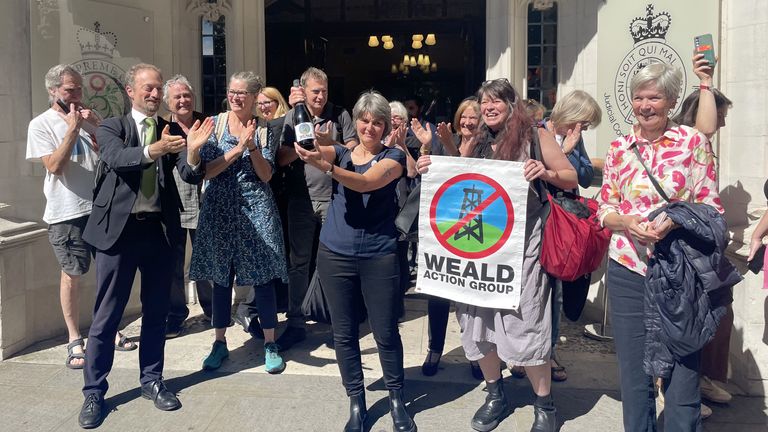The future of new oil and gas projects in the UK has been thrown into doubt following a landmark decision by the Supreme Court.
The court concluded the environmental impact of emissions from burning fossil fuels must be considered in planning applications for new extraction projects - not just the impacts of the emissions produced in extracting the oil.
The case hinged around an oil drilling project at Horse Hill in Surrey, granted planning permission by Surrey Count Council in 2019.
Local campaigner Sarah Finch argued the environmental impact of the project should have taken into account not just the carbon emissions created in extracting the oil, but the environmental impact when they are burned.
Her case was rejected by the High Court which argued it was up to councils to decide what is and isn't within the scope of an environmental impact assessment (EIA) of a planning application.

She challenged an earlier Court of Appeal ruling dismissing her case.
The council challenged the appeal, arguing that the law did not require it to consider "downstream" emissions as part of the assessment.
But in a ruling on Thursday, Supreme Court justices ruled three to two in favour of allowing her appeal and quashed the decision to grant planning permission for the site.
In his judgement, Lord Leggatt concluded: "In my view there was no basis on which the council could reasonably decide that it was not necessary to assess the combustion emissions."
He went on: "Given the agreed fact that all the oil produced would be refined, I see no reason why environmental impacts resulting from the process of refining oil should not in principle fall within the scope of the EIA for the extracting of oil."
The court did not conclude that fossil fuel emissions are unlawful. Only that they must be considered In an environmental impact assessment.
Keep up with all the latest news from the UK and around the world by following Sky News
Tap hereIn relation to the Horse Hill project Justice Leggatt concluded: "It is not disputed that these emissions, which can easily be quantified, will have a significant impact on climate. The only issue is whether the combustion emissions are effects of the project at all. It seems plain to me that they are."
Given the burden of scientific evidence of the negative environmental impact of carbon emissions, the ruling that the downstream impacts of burning extracted oil and gas must be considered by anyone applying to extract them is significant.
The decision, from the UK's highest court could have immediate implications for other fossil fuel extraction projects.
West Cumbria Mining (WCM), the company behind a coal mine in Whitehaven approved by the government in 2022 clearly felt this could be a possibility as their lawyers intervened in this latest case.
The ruling could also have a bearing on offshore oil and gas projects as while planning rules offshore are different, EIAs are also required.
WCM did not respond to a request for comment on why it intervened in the case, but if the campaigners' appeal against the Surrey oil site wins next month, it could mean "that you have to completely reassess whether that coal mine in Cumbria can happen at all", according to barrister Sam Fowles.
"It is extremely difficult to overstate the significance of this case," Mr Fowles, who specialises in planning and environment law at Cornerstone Barristers, said.
It has the potential to trigger the "beginning of the end of... new fossil fuel extraction in the UK going forward", he added.
Disclaimer: The copyright of this article belongs to the original author. Reposting this article is solely for the purpose of information dissemination and does not constitute any investment advice. If there is any infringement, please contact us immediately. We will make corrections or deletions as necessary. Thank you.



